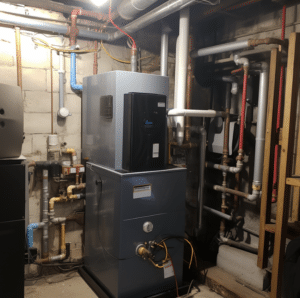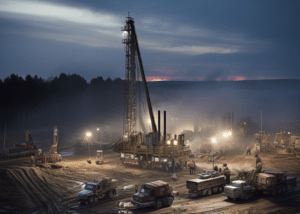Introduction – What Is A Gas Furnace And Gas Heat
As the mercury begins to drop, staying warm evolves from a luxury to a necessity. The cornerstone of a comfortable home during colder months is an efficient heating system. Among various options available today, the gas furnace has emerged as a popular choice for many.

Understanding The Gas Furnace
Furnaces are categorized on two key factors: the energy source and the heating mechanism.
- Energy Source: Home heating systems can use various energy sources, including natural gas, propane, oil, or electricity. Each source carries its own set of advantages and drawbacks in terms of efficiency, cost, environmental impact, and regional availability. The choice often depends on local infrastructure, personal preferences, and specific home requirements.
- Heating Mechanism: The heating mechanisms in these systems can generally be split into forced air or hydronic (water-based) systems. Forced air systems operate by heating air and distributing it throughout the home via a ductwork system. On the other hand, hydronic systems heat water that is circulated through pipes and radiators to distribute warmth.
So what is a gas furnace? For its energy source, it burns gas. And it employs one of the two heating mechanisms either forced air or water to carry heat around the house. That’s a gas furnace!
Gas Furnace Brands
The market for home heating solutions is vast and diversified, with numerous brands offering a range of systems. Among these, Trane, Carrier, and Goodman stand out due to their quality products and widespread usage.
Particularly in the field of gas furnaces, these brands have developed a strong reputation for reliability, efficiency, and performance. The detailed mechanics and advantages of gas furnaces will form the main topic of our continued discussion, providing an in-depth look at this popular home heating choice.
Trane
Trane is a respected and reliable name in heating systems. They’re known for creating robust and efficient furnaces that provide excellent heating. Their models, like the Trane S9V2-VS, boast advanced features such as variable speed blowers that adapt to your home’s heating needs, offering efficient use of energy.
Carrier
Carrier, a pioneer in HVAC systems, has consistently offered a range of energy-efficient gas furnaces. The Carrier Infinity 98, with Greenspeed Intelligence, is acclaimed for its quiet operation and precision temperature control, boasting an outstanding energy efficiency of up to 98.5% AFUE (Annual Fuel Utilization Efficiency).
Goodman
Goodman, known for affordability without compromising quality, offers a range of energy-saving furnaces. Goodman GMVC96, equipped with a variable-speed ECM blower motor, provides excellent energy efficiency coupled with low noise levels.
Lennox
Lennox is lauded for its range of high-efficiency gas furnaces. The aforementioned Lennox SLP98V, for instance, is a model of sustainability with its extremely high efficiency and very minimal greenhouse gas emissions.
Advantages of Gas Heat

Gas furnaces serve as efficient and super cost-effective methods of heating a home. Why is natural gas so cost-effective? One word: shale gas. The United States since 2010 became the biggest producer of natural gas and has a massive abundance – for the same reasons oil is so abundant in the US. Some of that has been diverted to Europe via LNG (liquified natural gas) because Europe experienced a gas crunch after the start of the Russo-Ukraine war.
Otherwise natural gas is very hard to transport across the ocean and the US energy producers and consumers have been taking advantage of the abundance. Gas furnaces offer rapid and uniform heat distribution and are typically less expensive to run than electric heating systems. Furthermore, natural gas, the most common fuel source for these furnaces, is often less costly and burns cleaner than other fuels, translating to lower CO2 emissions.
Disadvantages and Environmental Impact of Gas Heat
While gas furnaces indeed offer a range of benefits such as efficiency, cost-effectiveness, and cleaner combustion compared to some other fuels, there are several drawbacks to consider as well. Notably, even though natural gas burns cleaner than coal or oil, it still contributes to greenhouse gas emissions. These emissions, albeit lower, continue to contribute to climate change and can hinder efforts towards achieving net zero emissions.
In addition to environmental concerns, gas furnaces also require a consistent supply of natural gas, which can pose challenges in areas with limited infrastructure. Safety is another concern, as gas furnaces can potentially leak harmful gases like carbon monoxide if not properly maintained. Moreover, the installation costs of gas furnaces can be higher than other heating systems, requiring professional assistance and potentially significant modifications to the home.
Finally, while natural gas prices can be less volatile than oil prices, they are still subject to fluctuations in the global energy market – the LNG export to Europe is a case in point as it led to natural gas prices rising for all Americans. This can lead to unpredictable heating costs for homeowners, depending on regional and global supply and demand.
Carbon Reduction and Sustainability
Modern gas furnaces like Lennox SLP98V, which has an incredible 98.7% AFUE, contribute significantly to carbon reduction. By operating at higher efficiencies, they consume less fuel, therefore emitting lesser pollutants. Manufacturers are consistently innovating to make these devices more energy-efficient and sustainable, ultimately helping to lower our dependence on fossil fuels and reduce our carbon footprints.
Considerations Before Installing a Gas Furnace
Before installing a gas furnace, important factors such as the size of the furnace, professional installation requirements, and maintenance and safety considerations should be well-thought-out to ensure seamless operation.
Comparing Heating Systems
While gas furnaces may be an excellent choice for many, one should make a driven choice based on individual needs and affordability. There are other heating systems available like electric heat pumps, oil furnaces and more which can be a better fit in certain conditions.
Conclusion
Gas furnaces can be excellent heating solutions offering the twin virtues of efficiency and cost-effectiveness. However, considered research based on personalized needs and consultation with professionals is suggested to make the optimal choice for your home heating needs.
References
Additional research and reading can provide further insights into gas furnaces and other heating systems. Trusted sources like Energy Star’s official website and Consumer Reports provide impartial and comprehensive information to help make informed decisions.
